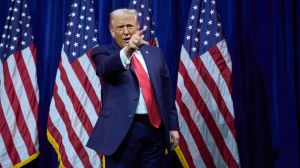Our Forked Tongues
In international relations hypocrisy is often a very good measure of how great a power a nation has become. Small powerless nations, confine...

In international relations hypocrisy is often a very good measure of how great a power a nation has become. Small powerless nations, confined to the margins of history have the luxury of moral consistency. Much of what they do and say is inconsequential, so they can afford to take the moral high ground. Great Powers on the other hand, have to act on a world stage that is necessarily fraught with contradictions. These powers have to often reconcile opposites: the preservation of their power with high principle, long term ambitions and short term expediency, high ideals with low politics, security with democracy.
Therefore we should not be surprised if India begins to sound more and more hypocritical. We stand up and loudly trumpet democracy as a value, partner the United States in promoting it, but make our own compromises with Myanmar and Sudan. We will emancipate ourselves from old fashioned third world solidarity only to trade in the oil, juntas and dictators, the sort of stuff the third world produces. We spent decades valiantly and unsuccessfully trying to combat the hegemony of big powers over the world order. It is a measure of our growing stature that we can materially align with that hegemony but struggle to find a way of gesturing against it.
This is the broad context in which our Iran policy should be seen. At an official level, India has taken the only stand it can take without contorting its tongue too much. Iran has a treaty obligation and it should abide by it. The West has an obligation to give diplomacy a full chance and avoid confrontation. But this formalistic response can barely disguise the fact that we have no moral ground to stand on when it comes to Iran. The Iran case is not just about the legal formalities. The Iran case is fundamentally about the structure of the global order.
What could India tell the Iranians with a straight face? For one thing, the IAEA verdicts on Iran hardly amount to a strong indictment of Iranian policy. It is the US that will insist on moving the goal post of compliance. Every single reason that we gave in order to develop a nuclear program is as valid for Iran as it is for us. Iran is situated in a hostile neighborhood. Given the track record of the United States, Iran is more likely to face outside intervention from hostile powers than we do. Why should the logic of nuclear deterrence not apply equally to Iran? If Arab states have not risked another attack on Israel because it is a nuclear power, why deny Iran the same protection?
After our nuclear tests, our most distinguished strategic analysts would blackmail liberals in the US by saying that even so much as suggesting that nuclear weapons might pose risks to the sub continent was down right racist. Why do we expect Iran to behave any more differently from India or Pakistan? One unstated assumption in US discourse is that Iran is not a democracy, but an Islamic regime. But this argument is fraught with difficulties. It seems to suppose that Islamic states cannot be strategically rational. But this claim would unravel the entire logic by which the possession of nuclear weapons has been justified. If the safety of nuclear weapons is contingent upon regime type, then God help us. If we think nuclear weapons make the world unsafe, why give up disarmament? On the other hand if we think they make countries in hostile neighborhoods safe, how can we possibly side with the United States8217; position on Iran?
So India takes recourse to a formal argument. You see, Iran signed the NPT, but we did not. But this is a bizarre position to take for two reasons. It morally elevates those states like India and Pakistan that completely rubbished NPT over those that are, let us say, trying to push its limits. But this position also fails to confront the fundamental inequity of the global order. Why are legality and treaty obligations only selectively invoked in the case of Iran? What meaning do treaty obligations have when the world8217;s most powerful nation itself espouses the proposition that treaties are mere expedients, not commitments of principle? When the powerful exempt themselves from legality, what meaning does legality have left?
It is easier to argue that countries do not need all the means necessary for their self defense when two conditions obtain. First, there is a worldwide consensus that nuclear weapons are undesirable, that disarmament is surer path to security than an arms race. But we ourselves have stopped believing in this proposition. Second, can the international order guarantee that powerful nations will not engage in unlawful interventions and jeopardize the security of countries like Iran? After Iraq, can any nation give this good faith assurance to Iran? The US security discourse has itself created micro insecurities. Unless there is a world order capable of resisting US hegemony, unless nations like India, China and Russia work to create credible guarantees that the US will not engage in global vigilantism, what right do we have to worry about nations arming themselves?
When formalism doesn8217;t work we retreat to our national interest. On this view, at the present juncture we should carefully balance our interest8217;s vis-a-vis the US and Iran. But this is a misleading way of looking at the problem. The choice is not between the United States and Iran. The choice is between two alternative conceptions of the world order. There is a world order in which the logic of nuclear deterrence is accepted and one in which nuclear weapons are regarded as objects of worry. In this choice, we have made our position clear. Unless we have some credible way of suggesting why disarmament is good, we have no leg to stand on vis-a-vis Iran.
The second choice is a world in which we move towards checking the unparalleled hegemony of one power and one in which we meekly let it have its way. In this respect we might still have some decisions to make, and Iran will be a test case. We should not be too hard on ourselves: hypocrisy and forked tongues are crosses great powers have to bear. But we will be forgiven if our machinations are in the service of resisting a unipolar world and being a genuine broker for peace. The national interest is best served by heeding Gentili8217;s warning: in international society the mere existence of great power should be a provocation.
The writer is President ,Centre for Policy Research
- 01
- 02
- 03
- 04
- 05































